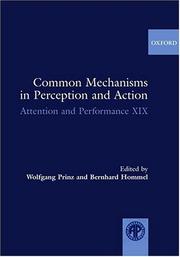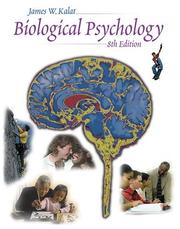| Listing 1 - 10 of 89 | << page >> |
Sort by
|
Book
ISBN: 9023211111 Year: 1973 Publisher: Assen Van Gorcum
Abstract | Keywords | Export | Availability | Bookmark
 Loading...
Loading...Choose an application
- Reference Manager
- EndNote
- RefWorks (Direct export to RefWorks)
Educational psychology --- 612.8 --- #gsdbP --- leerpsychologie --- leerprocessen --- leermoeilijkheden --- Zenuwstelsel. Zintuigen. Motorische neurowetenschappen
Book
ISBN: 9074027180 Year: 2002 Publisher: Houten Health Base
Abstract | Keywords | Export | Availability | Bookmark
 Loading...
Loading...Choose an application
- Reference Manager
- EndNote
- RefWorks (Direct export to RefWorks)
Pharmacology. Therapy --- Psychiatry --- geneesmiddelengebruik --- geneesmiddelen --- geneesmiddelentoediening --- farmacologie (farmacotherapie, geneesmiddelenleer) --- psychofarmaca --- bijwerkingen (nevenwerkingen) --- 612.8
Book
ISBN: 0890040591 9780890040591 Year: 1976 Publisher: New York: Raven Press,
Abstract | Keywords | Export | Availability | Bookmark
 Loading...
Loading...Choose an application
- Reference Manager
- EndNote
- RefWorks (Direct export to RefWorks)
Pathological physiology. Pathogenesis --- Pathology of the metabolism --- Nutritionary hygiene. Diet --- Hunger --- Physiological aspects --- Congresses --- Hunger. --- -612.8 --- Appetite --- Fasting --- Starvation --- Food Deprivation --- -Congresses --- Zenuwstelsel. Zintuigen. Motorische neurowetenschappen --- 612.8 --- Physiological aspects&delete& --- Famine --- Hunger - Physiological aspects - Congresses

ISBN: 0071054766 Year: 1996 Publisher: New York McGraw-Hill
Abstract | Keywords | Export | Availability | Bookmark
 Loading...
Loading...Choose an application
- Reference Manager
- EndNote
- RefWorks (Direct export to RefWorks)
Previously there were five sections, but the present edition has seven sections plus an appendix. The seven sections are 'General Principles of Toxicology' (Unit 1), 'Disposition of Toxicants' (Unit 2), 'Non organ-Directed Toxicity' (carcinogenicity, mutagenicity, and teratogenicity) (Unit 3), 'Target Organ Toxicity' (Unit 4), 'Toxic Agents' (Unit 5), 'Environmental Toxicology' (Unit 6), and 'Applications of Toxicology' (Unit 7). Without permitting the fifth edition to become unwidly in size and prohibitive in cost, we have added three new chapters: 'Toxicokinetics, Mechanisms of Toxicity', and 'Toxic Responses of the Endocrine System', as well as an Appendix on 'Recommended Limits for Exposure to Chemicals'. Half of the 34 chapters of the fifth edition have been written by authors not associated with the fourth edition. The fifth edition of Casarett and Doull's Toxicology: The Basic Science of Poisons marks its twentieth anniversary. The fifth edition, as the previous four, is meant to serve primarily as a text for, or an adjunct to, graduate courses in toxicology. Because the four previous editions have been widely used in courses in environmental health and related areas, an attempt has been made to maintain those characteristics that make it useful to scientists from other disciplines. This edition will again provide information on the many facets of toxicology and especially on the principles, concepts, and modes of thought that are the foundation of the discipline. Mechanisms of toxicity are emphasised. Research toxicologists will find this book an excellent reference source to find updated material in areas of their special or peripheral interests.While the overall framework of the fifth edition is similar to the previous four, it has undergone some significant changes. The fifth edition reflects the marked progress made in toxicology this decade. For example, the importance of apoptosis, cytokines, growth factors, oncogenes, cell cycling, receptors, gene regulation, transcription factors, transgenic animals, polymorphisms, etc.
Toxicology --- Poisoning --- Poisons --- Toxicologie --- Empoisonnement --- Poisoning. --- Poisons. --- Chemicals --- Medicine --- Pharmacology --- Poisonings --- Pharmaceutical Preparations --- poisoning --- Toxicology. --- 612.8 --- toxicologie (gez) --- Poison --- POISONING --- POISONS --- ENVIRONMENTAL POLLUTANTS --- TOXICOLOGY --- DIAGNOSIS --- METABOLISM --- TOXICITY

ISBN: 0198510691 Year: 2002 Volume: 19 Publisher: Oxford Oxford University Press
Abstract | Keywords | Export | Availability | Bookmark
 Loading...
Loading...Choose an application
- Reference Manager
- EndNote
- RefWorks (Direct export to RefWorks)
Book
ISBN: 906087871X Year: 1975 Publisher: Leuven : Acco,
Abstract | Keywords | Export | Availability | Bookmark
 Loading...
Loading...Choose an application
- Reference Manager
- EndNote
- RefWorks (Direct export to RefWorks)
antibiotica --- Pharmacology. Therapy --- Infectious diseases. Communicable diseases --- 612.8 --- farmacologie --- geneeskunde --- geneesmiddelen --- geneesmiddelengebruik --- geneesmiddeleninformatie --- Farmacie - Geneesmiddelen --- antibiotica. --- Farmacologie Therapie. --- Infectieziekten Besmettelijke ziekten.
Book
ISBN: 9076988552 Year: 2005 Publisher: Amsterdam Natuurwetenschap en Techniek
Abstract | Keywords | Export | Availability | Bookmark
 Loading...
Loading...Choose an application
- Reference Manager
- EndNote
- RefWorks (Direct export to RefWorks)
1: Waartoe dienen geneesmiddelen? - 2: Hoe worden we ziek? - 3: Werkingsstrategieën - 4: Tactiek op nanoschaal - 5: Hoe weet een geneesmiddel waar het moet zijn? - 6: Vaccins en antistoffen - 7: Planten en kruiden, natuur en chemie - 8: Het placebo-effect - 9: Bijwerkingen - 10: Hoe ontwikkel je een nieuw geneesmiddel - 11: De klassieke aanpak: rede en toeval - 12: De moderne aanpak; ziekte zoekt geneesmiddel - 13: Gentechnologie, de sleutel tot nieuwe geneesmiddelen - 14: Waarom worden we ziek?
farmacologie --- Pharmacology. Therapy --- geneesmiddelen --- Geneesmiddelen --- 615 geneesmiddelen --- 612.8 --- 615 --- geneesmiddelengebruik --- geneesmiddeleninformatie --- gentechnologie --- medicamenteuze verslaving --- placebo --- vaccinatie --- Farmacologie (geneesmiddelenleer) --- Farmacologie --- Gentechnologie --- Placebo --- Vaccins --- 615.01 --- Farmacie - Geneesmiddelen --- Geneesmiddel

ISBN: 0534588581 0534588166 9780534588168 9780534588588 053458859X 9780534588595 Year: 2004 Publisher: Belmont (Cal.) : Thomson/Wadsworth,
Abstract | Keywords | Export | Availability | Bookmark
 Loading...
Loading...Choose an application
- Reference Manager
- EndNote
- RefWorks (Direct export to RefWorks)
Affective and dynamic functions --- #PBIB:1999.1 --- #PBIB:2004.1 --- 159.91 --- 612.8 --- Biologische psychologie --- Gedragsgenetica. --- Gedragspatronen. --- Neurologie. --- Neuropsychology. --- Psychobiologie. --- Psychobiology.
Book
ISSN: 05481198 ISBN: 9060161556 Year: 1982 Publisher: Alphen aan den Rijn ; Brussel Stafleu
Abstract | Keywords | Export | Availability | Bookmark
 Loading...
Loading...Choose an application
- Reference Manager
- EndNote
- RefWorks (Direct export to RefWorks)
Psychiatry --- Pharmacology. Therapy --- Benzodiazepines. --- 612.8 --- benzodiazepine --- farmacologie --- geneeskunde --- geneesmiddelen --- Benzodiazepine --- Benzodiazepine Compounds --- Farmacie - Geneesmiddelen --- Pharmacology --- Benzodiazepines --- Textbooks & monographs 1891-2000 --- Textbooks & monographs 1891-2000.
Book
ISBN: 9789035228665 9789035228573 9035228669 Year: 2007 Publisher: Maarssen Elsevier gezondheidszorg
Abstract | Keywords | Export | Availability | Bookmark
 Loading...
Loading...Choose an application
- Reference Manager
- EndNote
- RefWorks (Direct export to RefWorks)
Kennis van de basisprincipes vormt een voorwaarde voor het verwerven van inzicht in de speci farmacologie en de farmacotherapie. In dit boek worden deze basisprincipes systematisch gepresenteerd en met voorbeelden uit de dagelijkse praktijk ge ustreerd. Uitgangspunt daarbij is het gegeven dat de algemene farmacologie meer een begripsvak dan een leervak is. In deze tweede druk zijn de inzichten van de afgelopen jaren verwerkt, met name op het gebied van kennis van het genoom en de daarmee samenhangende variabiliteit tussen pati en. Ook nieuwe toedieningsvormen worden uitvoerig besproken. Veel aandacht is besteed aan het beeldmateriaal. Algemene farmacologie is bestemd voor eenieder die ge eresseerd is in de farma-cologie en de farmacotherapie, zoals studenten geneeskunde, farmacie en (medische) biologie Maar ook degenen die de opleiding tot arts of apotheker al hebben voltooid of anderszins geïnteresseerd zijn in geneesmiddelen, kunnen hun kennis hiermee verrijken en zo bijdragen aan een adequate farmacotherapie. Het boek kwam tot stand onder redactie van prof.dr. J.M. van Ree en prof.dr. D.D. Breimer. J.M. van Ree is hoogleraar psychofarmacologie aan de Universiteit Utrecht en directeur van het Rudolf Magnus Instituut voor Neurowetenschappen van het Universitair Medisch Centrum Utrecht. D.D. Breimer is hoogleraar farmacologie aan de Universiteit Leiden en was wetenschappelijk directeur van het Leiden/Amsterdam Center for Drug Research (LACDR). Diverse auteurs leverden een bijdrage aan dit boek, ieder op het terrein van hun eigen specialisme.
Geneesmiddelen. --- farmacologie --- Pharmacology. Therapy --- Human anatomy --- anatomie --- embryologie (geneeskunde) --- Human embryology --- 615 --- geneesmiddelen --- therapie --- Farmacologie --- 612.8 --- Farmacie - Geneesmiddelen --- Anatomie --- Embryologie --- Fysiologie --- Ziekteleer --- Tekenen
| Listing 1 - 10 of 89 | << page >> |
Sort by
|

 Search
Search Feedback
Feedback About UniCat
About UniCat  Help
Help News
News